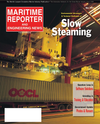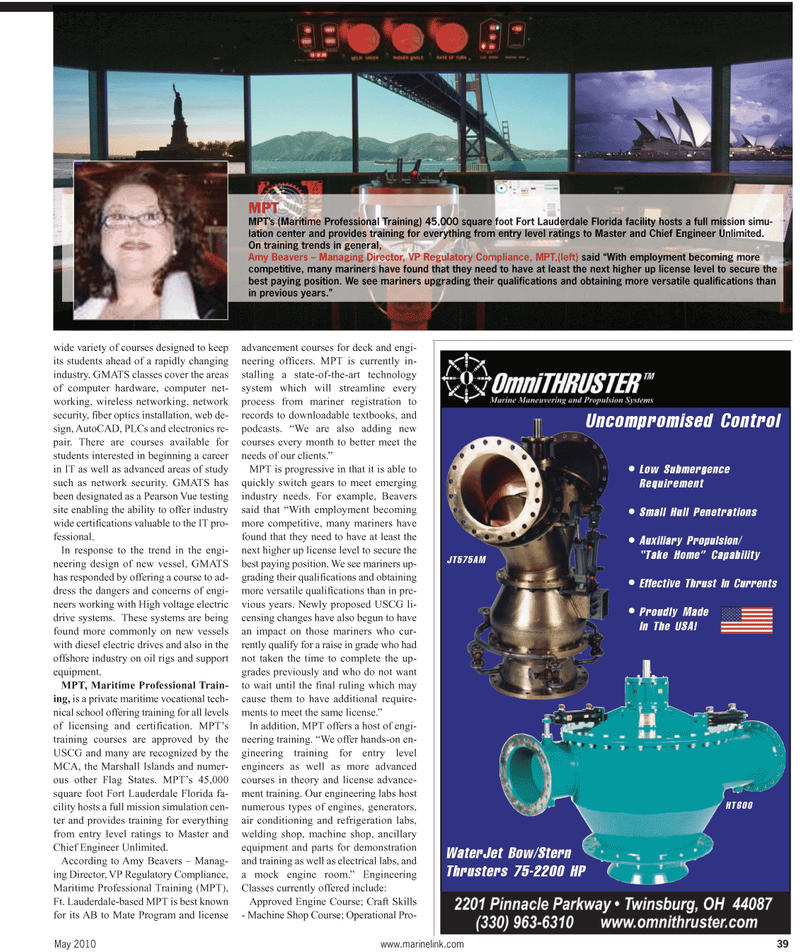
Page 39: of Maritime Reporter Magazine (May 2, 2010)
Read this page in Pdf, Flash or Html5 edition of May 2, 2010 Maritime Reporter Magazine
wide variety of courses designed to keep its students ahead of a rapidly changing industry. GMATS classes cover the areas of computer hardware, computer net- working, wireless networking, network security, fiber optics installation, web de- sign, AutoCAD, PLCs and electronics re- pair. There are courses available for students interested in beginning a career in IT as well as advanced areas of study such as network security. GMATS has been designated as a Pearson Vue testing site enabling the ability to offer industry wide certifications valuable to the IT pro- fessional.
In response to the trend in the engi- neering design of new vessel, GMATS has responded by offering a course to ad- dress the dangers and concerns of engi- neers working with High voltage electric drive systems. These systems are being found more commonly on new vessels with diesel electric drives and also in the offshore industry on oil rigs and support equipment.
MPT, Maritime Professional Train- ing, is a private maritime vocational tech- nical school offering training for all levels of licensing and certification. MPT’s training courses are approved by the
USCG and many are recognized by the
MCA, the Marshall Islands and numer- ous other Flag States. MPT’s 45,000 square foot Fort Lauderdale Florida fa- cility hosts a full mission simulation cen- ter and provides training for everything from entry level ratings to Master and
Chief Engineer Unlimited.
According to Amy Beavers – Manag- ing Director, VP Regulatory Compliance,
Maritime Professional Training (MPT),
Ft. Lauderdale-based MPT is best known for its AB to Mate Program and license advancement courses for deck and engi- neering officers. MPT is currently in- stalling a state-of-the-art technology system which will streamline every process from mariner registration to records to downloadable textbooks, and podcasts. “We are also adding new courses every month to better meet the needs of our clients.”
MPT is progressive in that it is able to quickly switch gears to meet emerging industry needs. For example, Beavers said that “With employment becoming more competitive, many mariners have found that they need to have at least the next higher up license level to secure the best paying position. We see mariners up- grading their qualifications and obtaining more versatile qualifications than in pre- vious years. Newly proposed USCG li- censing changes have also begun to have an impact on those mariners who cur- rently qualify for a raise in grade who had not taken the time to complete the up- grades previously and who do not want to wait until the final ruling which may cause them to have additional require- ments to meet the same license.”
In addition, MPT offers a host of engi- neering training. “We offer hands-on en- gineering training for entry level engineers as well as more advanced courses in theory and license advance- ment training. Our engineering labs host numerous types of engines, generators, air conditioning and refrigeration labs, welding shop, machine shop, ancillary equipment and parts for demonstration and training as well as electrical labs, and a mock engine room.” Engineering
Classes currently offered include:
Approved Engine Course; Craft Skills - Machine Shop Course; Operational Pro-
May 2010 www.marinelink.com 39
Uncompromised Control
WaterJet Bow/Stern
Thrusters 75-2200 HP
JT575AM
HT600
Low Submergence
Requirement
Small Hull Penetrations
Auxiliary Propulsion/ “Take Home” Capability
Effective Thrust In Currents
Proudly Made
In The USA!
MPT
MPT’s (Maritime Professional Training) 45,000 square foot Fort Lauderdale Florida facility hosts a full mission simu- lation center and provides training for everything from entry level ratings to Master and Chief Engineer Unlimited.
On training trends in general,
Amy Beavers – Managing Director, VP Regulatory Compliance, MPT,(left) said “With employment becoming more competitive, many mariners have found that they need to have at least the next higher up license level to secure the best paying position. We see mariners upgrading their qualifications and obtaining more versatile qualifications than in previous years.”

 38
38

 40
40
